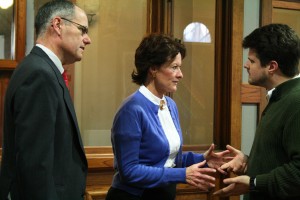In memory of the U.S. bombing of Hiroshima in 1945, Actors Theatre of Grinnell arranged for a performance of the renowned play “Copenhagen” at the Grinnell Arts Center last weekend. Mark Schneider, Physics, Michael Hunter ’02 and Liz Hansen, an actor and director from Grinnell, performed in the play.

The story takes place in the memory of the spirits of Neils Bohr, played by Schneider, and his wife Margrethe Bohr, played by Hansen, who begin the play with a conversation in a desperate attempt to find out the answer to the question, “Why did [Heisenberg] come to Copenhagen?” Werner Heisenberg, played by Hunter, a German physicist who had been Bohr’s student and had shared a dear relationship with him, is suddenly on a different end of the war than Bohr, the famous German physicist considered as the father of quantum physics. Bohr, on the other hand, is half-Jewish and living in Denmark under Nazi occupation. The two-hour-long play delves deep into many meetings that Heisenberg had with Bohr regarding various nuclear debates, including the utility and control of nuclear power and reasons why or why not to build a nuclear bomb.
At the end of the play, Hiroshima survivor Mikio Matsubayashi gives a speech about how the bombing shaped his life in a completely different way. He was eight-years-old when the first bomb landed 66 years ago, and moved to the United States at the age of 20. He said that neither he nor any of his family members had suffered from any of the radiation after-effects.
Matsubayushi, who flew from Los Angeles for the showing of the play, also said this was the first time that he spoke in a public setting about his experience with the “Little Boy”—the codename of the atomic bomb dropped on Hiroshima.
Dr. J. R. Paulson, a family planning specialist from Grinnell Regional Medical Center expressed his excitement over the play being shown at Grinnell Arts Center. Dr. Paulson, who graduated from College with a major in philosophy, said he was interested in the aspect of scientific inventions and the morality and ethics involved in them.
“From my background I really appreciate to know that there is a very great overlap of philosophy and morality of what we do,” Dr. Paulson said.
The play was performed in Reader’s Theatre, a form of minimalist theatre where the actors read from their script on stage. Schneider described the challenges of the particular form, especially in repeatedly looking back to the script and knowing where to start reading.
“Although it made learning of lines easier, but it made acting a lot harder,” Schneider said.
Hunter explained that he saw the play for the first time in London and liked it immediately.
“Many years later and many life choices later, when we were talking about theatre productions that we could do with Actor’s Theatre and I thought, we could do Copenhagen.”
He then proposed the idea to Grinnell Arts Center President, Tom Lacina, who suggested that it would be a fitting theme for the anniversary of the Hiroshima bombing. Hunter then approached Hansen and Schneider, who he had worked with on several other productions.
Hansen, who is the director of theatre at Grinnell High School, has a long tradition of working with the College, as her involvement with the College students dates back to 1990.
“We are so fortunate to have the generosity of Grinnell College and the wonderful students,” Hansen said. “[We] are able to have a better [theatre] program that has definitely enriched our community.”















































